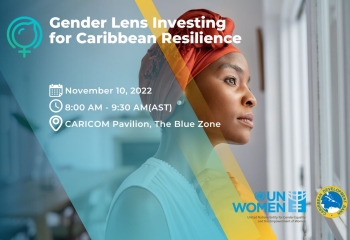CDB to introduce initiatives targeting women and the indigenous to increase opportunities

Tackling income inequality and strengthening economic opportunities for women are high on the Caribbean Development Bank’s (CDB) agenda, says President Dr Gene Leon. In his address last week to the Bank’s Board of Governors at the Bank’s 52nd Annual Meeting in the Turks and Caicos Islands, Dr Leon spoke of existing and new programmes to be formalised by the financial institution.
A new initiative with the International Trade Centre (ITC), others focused on women led Micro Small and Medium Enterprises (MSMEs) and some targeting the indigenous community aimed at monetising and preserving cultural artefacts and traditions by creating new revenue streams for these groups, were highlighted.
According to Dr Leon, “CDB continues to help boost women’s participation in private sector development in its BMCs (Borrowing Member Countries),and is currently coordinating more support to expand their access to finance and investment, training, coaching, and mentoring and other technical assistance. We seek to meet a target of supporting at least 2,000 women-owned/led MSMEs by 2024.”
The Bank plans to become a regional focal point for an initiative called SheTrades and implement other programmes focused on women of the indigenous communities of BMCs. Through SheTrades, CDB will join a global practice with a global partner and be positioned to match and leverage additional resources to improve market access for women-owned businesses. Moreover, CDB would create a sizeable anchor for future gender-specific interventions in a programmatic fashion, he added.
CDB’s President also challenged the leadership in its Borrowing Member Countries to consider greater inclusion.
“The Bank is also encouraging the governments in its BMCs to ensure that their public procurement frameworks address any systemic barriers to women’s participation and that they also promote increased participation by and opportunities for women-owned businesses, indigenous people and persons with disabilities,” he stated.
Inclusive trade is a critical component to achieving gender parity. It creates more job opportunities for women, with higher wages and better working conditions. The Bank continues to mainstream gender into its programming and invest in gender specific interventions informed by its Gender Policy and Strategy. All activities work to achieve Sustainable Development Goal 5 which speaks to attaining gender equality and empowerment of all women and girls catalysed by expanded economic growth and enhanced business performance and other drivers.


